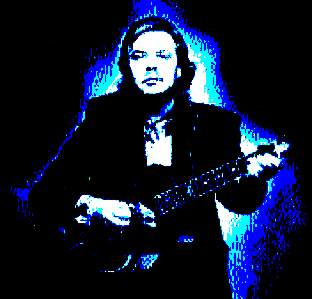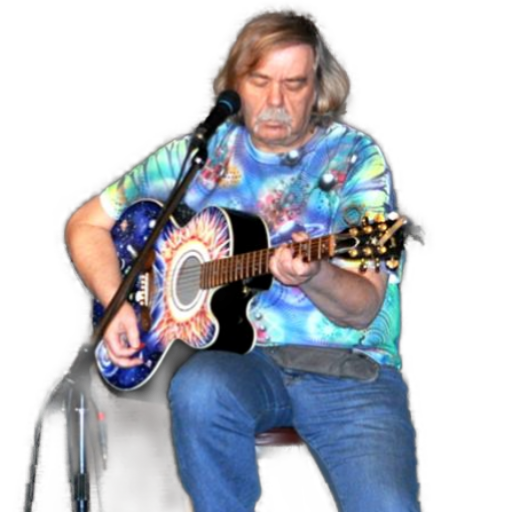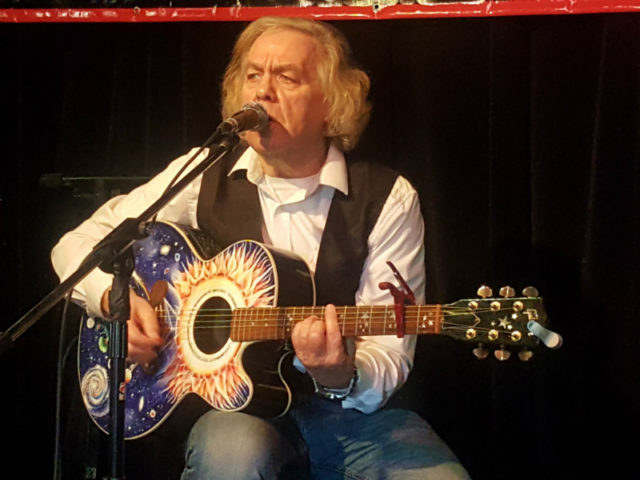
Brian Gladstone in the early days
from HHGI Guitar Magazine, August 2000. BY Linda Brady …

Brian Gladstone in the early days
"I was fortunate in that I was looking for myself, in the '60's, when the whole folk thing was booming. I started listening to a lot of early Dylan,
Phil Ochs, Peter Paul and Mary. But when I heard Doc Watson play the guitar, it just blew me away. It grounded me. I've had a passion for it ever
since." So says Toronto native Brian Gladstone about the origins of his hybrid American sound. Even he can't quite pinpoint what to call his style.
"Well, it's fingerpicking. I see my playing as being the framework for the lyrics," he says. "Sometimes people call it folk, or blues, or bluegrass. I
don't really know how to differentiate it," Brian says. "My CD gets played all over the world – Slovenia, places I've never heard of. I think it would
get more play if people knew what to call it. My producer (Robert Digoia) said, 'It's just Brian!' And that sums it up."
Brian has a slogan of sorts he uses to describe his musical sensibilities –
"An analogue guy in a digital world." He is a bit of a contradiction – to
quote his liner notes "an electrical inventor engineer in the hi-tech
magnetics realm of research and design" on one hand, an earthy acoustic
musician on the other. His debut album, BACK TO THE DIRT, is loaded with
spirited rhythm licks and intelligent lyrics.
The fifteen selections on BACK TO THE DIRT wander a path wide in subject
matter and inspiration. "Who Killed Betty Two-Shoes" is a story of a free
spirited dancer found with her feet encased in cement at the bottom of Lake
Ontario. "Cyber-Babe" is a goofy take on Internet romantic fantasy. Brian
also delves into dark social commentary, dealing with the homeless issue in
"Children of the Snow." He pays tribute to his forefathers with "Hesitation
Blues," a Reverend Gary Davis tune, and with the medley, "Lengthy Diatribe,
where he meshes songs by Doc Watson, Blink Blake and Mississippi John Hurt.
Brian mans all the acoustic instruments, including guitars, Dobro and
six-string banjo and acoustic bass. He is joined on some cuts by Bonnie and
Lindsey Gladstone on vocals, Daniel Shlagbaum on various percussion
instruments and Ralph Hassel on bass.
Brian recorded the album in his basement over the course of two years. "I've
been putting the home studio together for a number of years, picking
equipment at sales here and there. I've been writing my own stuff for years.
Doing the CD was more of a whim. Why not record this, I thought?"
The record has a crisp, warm quality, and for that, Brian gives kudos to his
engineer and producer, Robert DiGioia "Anyone who works with me for two years
deserves a mention," Brian says. "Robert was a great asset for many reasons
— but mostly because he believed in me and understood what I was about — as
much as a mortal can unravel my multi-layered complexities! And (he) knew
when I could do better. He has previously worked with the likes of David
Bowie, KISS, Rush, Celine Dion, Glenn Gould, Chantal Kreviazuk, 54-40, the
Cult, Tom Cochrane and many others. I'm lucky that he worked for far less
than normal, and for his dedication to BACK TO THE DIRT."
Brian uses a rather unorthodox picking style to achieve his lush sound.
"It's something I saw watching Jim Kweskin." Jim Kweskin's Jug Band was one
of the stalwarts of the Greenwich folk scene in the sixties. "He held the
pick as a standard guitar player would, between the thumb and the
forefinger," Brian explains. "I use that on bass notes and the bottom three
strings, but then I also use the other three fingers – the baby for the high
e, middle for the next string, and so on. It's a challenging style to learn,
and it takes years to do it cleanly. But once you know it, you have so many
notes available to you. You can switch from strumming to fingerpicking to
flat-picking without missing a note. Other guys have to stick their pick in
their mouth, or palm their pick when they want to switch to fingerpicking. I
can do it interchangeably, without stopping. It's a bit restrictive, because
you do a lot of lead notes on the high strings, and it's hard to get your
fingers up to speed, but you learn to work around that."
Brian is now hard at work on his second album, titled PSYCEDELIC PHOLK
PSONGS. "I hope it's out in January. Everything I did wrong on the first one
I hope to correct on this one!" He fought a bad case of tendonitis while
recording BACK TO THE DIRT, which he felt affected some of the notes. "I
should have waited it out, and healed. But I was too anxious to get it done.
And, on BACK TO THE DIRT, I played almost everything. It was exhausting – but
that was mostly because I didn't really know a lot of musicians into this
style."
Fortunately, Brian will have some backup on the new CD, in the shape of
like-minded souls he met this year at a blues festival. "Their band is called
Dark Holler," he says. "They're a bunch of young, energetic, acoustic blues
musicians. They played after me at the festival. The lead guitar player (Mike
Robertson) came up to me and started asking a lot of questions – 'How do you
play this and that? I've been trying to learn that.' And for me that's –
whoa – instant friendship." He was particularly impressed with vocalist and
keyboardist, Julian Faust. "When I was that age, I don't think I was nearly
as good as he is. He looks at me as sort of a mentor. And that's something
I want to do, pass on this style. It's grounding."
As for marketing, Brian does a lot of legwork. "When I play in clubs,
coffeehouses, I try to meet everybody, make one fan at a time. I try and
sell the CD, but if they can't buy it, I'll give it to them. I've also spent
months, one or two hours a day, searching for radio shows, via the Internet,
that plays similar music. I send the music to them, and then keep in touch.
And I answer all my mail, everyday. Really, I never stop."
Brian's hard work has paid off, too. "The CD is doing better than I
expected. I am sort of overwhelmed with its success. But it really isn't
about money. It is a passion – if I had done it for money, I would have gone
for a much more commercial sound. But fingerpicking, especially, is so
grounding for me.
"I have a theory. Back in college, zoology class, I think, they talked about
what sets man apart from other animals. One defining thing is our opposable
thumb and forefinger. And that's what we use to pick with. It's part of our
evolution, something that goes back to a cellular level.
"Harry Chapin once said, 'If that's your thing, just do it. And even if your
mother thinks you suck, just do it anyway. Work on it, and you'll make it a
success.'" Brian paused, then added. "That sums it up. Whatever level of
success I'll reach, I'll be happy, as long as I keep doing what I love."

